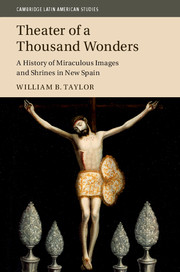Book contents
- Frontmatter
- Dedication
- Contents
- List of Figures
- List of Maps
- List of Tables
- Preface and Acknowledgments
- Archive Abbreviations
- Introduction
- Part I Bearings: Historical Patterns and Places of Image Shrines
- Part II Soundings: Divine Presence, Place, and the Power of Things
- 5 Making Miracles
- 6 Relics, Images, and Other Numinous Things
- 7 Religious Prints and Their Uses
- 8 Placing the Cross in Colonial Mexico
- 9 Pilgrims, Processions, and Romerías
- Conclusion
- Appendix 1 Colonial Image Shrines
- Appendix 2 When Shrines Began
- Appendix 3 Other Saints
- Index
5 - Making Miracles
from Part II - Soundings: Divine Presence, Place, and the Power of Things
Published online by Cambridge University Press: 05 September 2016
- Frontmatter
- Dedication
- Contents
- List of Figures
- List of Maps
- List of Tables
- Preface and Acknowledgments
- Archive Abbreviations
- Introduction
- Part I Bearings: Historical Patterns and Places of Image Shrines
- Part II Soundings: Divine Presence, Place, and the Power of Things
- 5 Making Miracles
- 6 Relics, Images, and Other Numinous Things
- 7 Religious Prints and Their Uses
- 8 Placing the Cross in Colonial Mexico
- 9 Pilgrims, Processions, and Romerías
- Conclusion
- Appendix 1 Colonial Image Shrines
- Appendix 2 When Shrines Began
- Appendix 3 Other Saints
- Index
Summary
The hold of miracles on the imagination and devotional practices of Catholic Christians is at the heart of the history of shrines, “prodigious” images, and divine presence in the early modern period. But miracles are an elusive subject, perhaps especially for New Spain. Colonial-era writings confidently regarded them as acts of God that defy natural laws, but obviously historians can know with any certainty only that people have believed such events happened and might happen again. Even for belief the record usually is terse, and miracles are a moving target: accepted knowledge of the laws of nature, standards of verification, and mainstream thought about diabolism changed, rendering some events once considered miracles curiosities of nature or demonic deceptions. Nevertheless, there are some constants in official and popular expectations for miracles, especially that many of the colonial accounts echoed miracles worked by Christ and treated in the Gospels as parables of salvation: sight for the blind, hearing and voice for the deaf and mute, healthy limbs for the lame, sudden healing of the mortally ill, resuscitations of the recently deceased, escapes from mortal danger on land and sea, and exorcisms. The healings, exorcisms, calming of waters, multiplication of loaves and fishes, and the rest relieved pain, suffering, and want in this world, but they also stood for something more glorious – spiritual purification and enlightenment, a good death, and the prospect of a soul's salvation. As Jesus said when he healed the blind man in John 9, “I am the light of the world.” Often the depiction of miraculous images of Christ and the Blessed Mary conveyed this transcendent meaning. Take the radiance surrounding the image of the Virgin of Guadalupe or, on the cover of this book, José de Páez's painted “portrait” of the miraculous Christ of Ixmiquilpan (ca. 1770), bathed from above in a heavenly light that focuses the viewer's attention squarely on the figure and sacrifice.
Within this shared understanding, there were bound to be disagreements and reservations. Priests knew to teach the salvific promise of Christ's miracles, while parishioners were more likely to think first of pressing problems in the here and now.
- Type
- Chapter
- Information
- Theater of a Thousand WondersA History of Miraculous Images and Shrines in New Spain, pp. 309 - 360Publisher: Cambridge University PressPrint publication year: 2016

